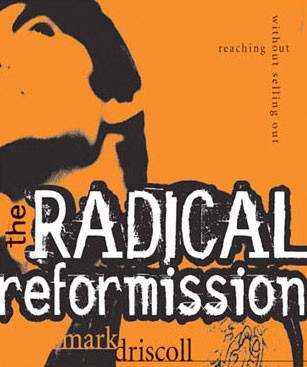Eat, Drink & Be A Merry Missionary
or Why Don’t You Come Join My Party?
Mark Driscoll used a combination of conservative doctrine and cultural liberalism to build his church. Some snippets from Mark Driscoll’s book The Radical Reformission:
Reformission evangelism, patterned after the example of Jesus, is particularly appropriate for our current economy, in which people live much of their lives pursuing experiences… Reformission evangelism to our growing experience economy will require Christians and churches to steep the gospel in the culture with increasing creativity, hospitality, and authenticity. This is necessary because lost people living in an experience-based economy are willing to immerse themselves in the life of a Christian community to experience it for themselves and to see firsthand the experiences of people Jesus has transformed.
- Reformission evangelism blurs the lines between evangelism and discipleship, enabling non-Christians to learn a great deal about Scripture and the Christian life before making a decision for Christ.
- People’s conversion to Jesus is also a conversion of their old lifestyles to his mission of reaching lost people. This enables them both to be involved in reformission even before their own conversion—through preexisting relationships with people both inside and outside of the church—and habituates them if and when they are converted to be about reformission.
- Their conversion is not merely a mental assent to facts they believe but is a conversion of the totality of their lives. This prevents them from being carnal Christians and people who live apart from repentance and holiness, wrongly believing they have been saved because they have a few theological facts in order.
- Reformission insists that evangelism is more about a lifestyle for all of God’s people than just a ministry program or department for some of God’s people, and that the gospel is made clearest by the honest words and open lives of those who have been transformed by grace.
In theory, reformission evangelism may sound wonderful. But for it to happen in reality, God’s people must first admit that their own attitudes [towards people] often get in the way.
He does state that it all depends on whom we are trying to reach, and describes his initial hatred of Florida people when visiting there and being unable to find—in a dire emergency—any diapers besides adult ones. Does anyone have any experiences or opinions on this that they’d like to share?



























August 10th, 2011 at 2:06 pm
I think it would be a mistake to claim what Driscoll argues for as culturally liberal. This relegates it unnecessarily to a place of opposition for conservatives. I’m reading the book at the moment, and though Driscoll uses modern language, his presentation is essentially what the church did early in its history, and what (mostly conservative) Christians have *not* been doing in the last hundred and fifty years or so, and which we rightly ought to reclaim.
August 10th, 2011 at 2:17 pm
Good point. But I think that’s the term Driscoll uses. I guess the meaning of it varies in different contexts.
August 12th, 2011 at 9:27 am
True, that. Also, Driscoll’s misreading of the patriarchs was irritating, but then I suppose there aren’t *that* many people who have read Jordan’s Primeval Saints yet. :p
August 12th, 2011 at 11:46 am
Yes, my thoughts exactly.